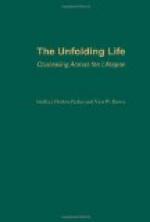CHAPTER VI
THE JUNIOR AGE—NINE TO TWELVE
The years we are now to consider are among the most interesting in all the period of development, and among the most exacting, as well, in the problems they present. These problems are related, in the main, to the “new invoice of energy” which has come into the life, the social feelings, habit formation and hero worship, and knowledge and patience are almost exhausted in their solution.
A general survey of the period reveals much that we are already familiar with, together with certain new conditions. We find that some of the winsomeness and much of the demonstrativeness and dependency of earlier childhood are gone. The sense of approaching manhood or womanhood is beginning to stir in the soul and, coincident with it, a growing independence is manifest. While the child must still be under authority, the wisest nurture will consult his feelings and wishes as far as possible, for just beyond this period lies life’s crisis, and every bond of sympathy and confidence must unite the helper to the one to be helped as the stormy passage is entered upon.
With all this growing independence, however, life is very far from possessing the marks of maturity. It is careless and care free, irresponsible in general, yet proud to carry definite responsibilities. There is delight in anything which suggests pre-eminence over others, such as badges, buttons and regalia of any kind, or public recognition and reward. Frankness almost to the point of brutality is a frequent trait, particularly of boys of this age, for they do not lend themselves as easily as the girls to the polite usages and subterfuges of society. This characteristic must have its counterbalance in genuineness and freedom from any affectation, especially a pious one, on the part of those dealing with the children, in order to win their love and respect.
A marked literalism is also apparent, and instead of the delicately imaginative child of earlier years a matter of fact young person stands out with a desire for exact statement and, if need be, under such oath as, “Upon your word,” or “Cross your heart and hope to die.” There is a strong sense of honor connected with such asseverations, and woe betide the one who swears falsely or tinkers with the truth.
There are certain conspicuous characteristics which demand a more detailed consideration, and the first to be noted is the energy.




